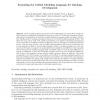Free Online Productivity Tools
i2Speak
i2Symbol
i2OCR
iTex2Img
iWeb2Print
iWeb2Shot
i2Type
iPdf2Split
iPdf2Merge
i2Bopomofo
i2Arabic
i2Style
i2Image
i2PDF
iLatex2Rtf
Sci2ools
153
click to vote
SOSYM
2002
2002
Extending the Unified Modeling Language for ontology development
Abstract. There is rapidly growing momentum for web enabled agents that reason about and dynamically integrate the appropriate knowledge and services at run-time. The dynamic integration of knowledge and services depends on the existence of explicit declarative semantic models (ontologies). We have been building tools for ontology development based on the Unified Modeling Language (UML). This allows the many mature UML tools, models and expertise to be applied to knowledge representation systems, not only for visualizing complex ontologies but also for managing the ontology development process. UML has many features, such as profiles, global modularity and extension mechanisms that are not generally available in most ontology languages. However, ontology languages have some features that UML does not support. Our paper identifies the similarities and differences (with examples) between UML and the ontology languages RDF and DAML+OIL. To reconcile these differences, we propose a modific...
Related Content
| Added | 23 Dec 2010 |
| Updated | 23 Dec 2010 |
| Type | Journal |
| Year | 2002 |
| Where | SOSYM |
| Authors | Kenneth Baclawski, Mieczyslaw M. Kokar, Paul A. Kogut, Lewis Hart, Jeffrey E. Smith, Jerzy Letkowski, Pat Emery |
Comments (0)

